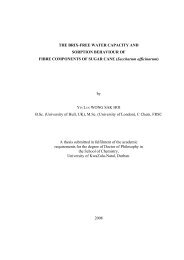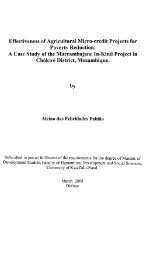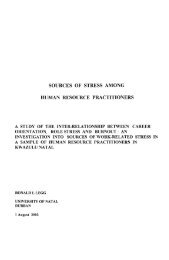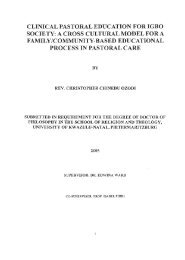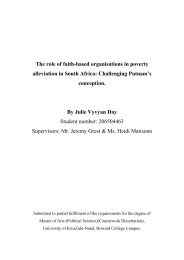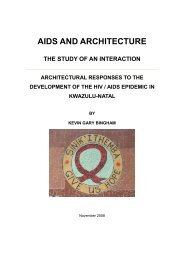View/Open - ResearchSpace - University of KwaZulu-Natal
View/Open - ResearchSpace - University of KwaZulu-Natal
View/Open - ResearchSpace - University of KwaZulu-Natal
Create successful ePaper yourself
Turn your PDF publications into a flip-book with our unique Google optimized e-Paper software.
The training that is <strong>of</strong>fered to volunteer caregivers has some gaps, for example, most<br />
literature on training only mentions the type <strong>of</strong> training and it does not explain its content.<br />
The training that is <strong>of</strong>fered is usually <strong>of</strong> short duration and it only deals with single topic<br />
areas such as HIV or T.B DOTS (Hancock et al., 200). For example, a study that was<br />
performed in six countries (Malawi, Kenya, Uganda, South Africa, Nigeria and Cameroon)<br />
on the significance <strong>of</strong> care giving work by the volunteer caregivers for PLWHA, shows that<br />
when it comes to training, most <strong>of</strong> the participants received their training from either home-<br />
based care organizations or from the governments. The percentage that received such training<br />
ranges from 30% in Cameroon to 86% or more in Kenya, South Africa and Uganda. Of those<br />
who received training, more than half (52%) received only a once-<strong>of</strong>f initial training before<br />
they started doing volunteer work. In contrast, 15% received ongoing weekly training. In<br />
between are those who have been trained more than once, but receive training less regularly<br />
than once a week. In Malawi, 94% <strong>of</strong> those who received special training received only a<br />
once-<strong>of</strong>f initial training. Cameroon has the highest percentage <strong>of</strong> care-givers who have<br />
received training (46%) (Budlender, 2009).<br />
Furthermore, the training that is <strong>of</strong>fered to volunteer caregivers is not comprehensive enough<br />
to cover all emerging diverse situations in caring for PLWHA (Ledwaba, 2005) such as basic<br />
care nursing with regard to psychiatric symptoms and conditions (Uys, 2002). Additionally<br />
this training does not equip volunteer caregivers to be pr<strong>of</strong>essionals in their field like nurses<br />
or doctors. There is lack <strong>of</strong> mentoring <strong>of</strong> volunteer caregivers which causes them not deliver<br />
their services effectively (Campbell & Foulis, 2004). These gaps in training imply<br />
insufficient knowledge for volunteer caregivers which can compromise the quality <strong>of</strong> care<br />
given to patients and may result in fatality for most patients (Budlender, 2009).<br />
Despite having insufficient materials, insufficient water supply, knowledge, support from<br />
families and communities, lack <strong>of</strong> remuneration and facing stigma, volunteer caregivers<br />
continue to work in HBC for PLWHA due to the positive contribution that they make in their<br />
communities (Marincowitz, Jackson & Fehesen, 2004). Issues that motivate volunteer<br />
caregivers to continue <strong>of</strong>fering their services in HBC for PLWHA will be discussed in the<br />
following section.<br />
21




